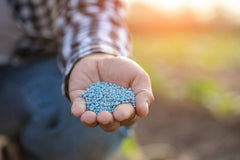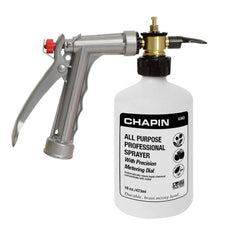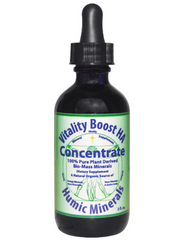Fulvic Acid: A Plant’s Best Friend
Every garden-lover and lawn connoisseur dreams of the same thing: lush green grass, gorgeous, colorful blooms, and plentiful fruits and veggies. Finding the right combination of vitamins, minerals, fertilizers, and other substances for your soil is imperative to creating the garden of your dreams.
It is often said that plants need just three simple things: water, soil, and sunlight. While these three are necessary, other compounds can be the difference between a good growing experience and a great one. Fulvic acid is just one of those organic materials that can make all the difference.
What is Fulvic Acid?
Fulvic acid is a natural substance that is a byproduct of plant decomposition, and it has been scientifically proven to aid in plant growth. When plants break down, the microbes and organisms that eat away at them produce different substances as a result – some of which are extremely valuable to plant growth and vitality.
Fulvic acid is just one example of a beautiful natural cycle that keeps plants and wildlife healthy throughout generations. Since it’s simple to use, it can be a valuable asset to your growing supplies.
Fulvic Acid vs. Humic Acid
Humic acid is another nutrient powerhouse that many growers are familiar with, and it has both similarities and differences with fulvic acid. While both are derived from organic matter in the soil, they accomplish different things and are both wildly valuable to your garden or farmland.
Fulvic acid is a smaller molecule and is soluble under different conditions than humic acid. This doesn’t make it inherently better; it just means the two are beneficial in different ways. However, the two together make a knockout blend that aids in plant growth and health unlike anything else.
Whether you choose to use them together or separately is merely a personal preference. Even just by itself, fulvic acid has tons of benefits that will make it your new favorite product for your lawn and garden.
Fulvic Acid Boosts Nutrient Absorption

One of the major benefits of fulvic acid is improved nutrient absorption. Fulvic acid is a remarkable chelating agent. A chelating agent is a type of chemical that binds to other materials. In this instance, it works its magic by forming complexes with minerals and nutrients in the soil, transforming them into more soluble and bioavailable forms for plant uptake.
In simpler words, fulvic acid allows plants to absorb ample vitamins and minerals from the soil without having to waste too much energy. This helps the plants use the materials more effectively since they aren’t spending copious amounts of energy finding and absorbing them.
How Does Fulvic Acid Help Plants Grow?
Perhaps the most exciting attribute of fulvic acid is its ability to invigorate root systems and ignite metabolic processes in plants, bolstering their growth and development. At the forefront of its capabilities, we have enhanced root development. Root development can be considered the most important part of the plant-growing process and allows the plant to anchor itself firmly into the soil, providing extra stability and resilience.

Fulvic acid also helps with overall plant metabolism. Just like with humans, plant metabolism refers to how quickly and efficiently plants make food. From facilitating photosynthesis to optimizing cellular respiration, fulvic acid fuels the metabolic machinery constantly running in the background of all plants.
As a natural chelating agent, fulvic acid allows plants to have more access to all the building blocks necessary for cellular processes, but there is such a thing as too much. The overuse of certain nutrients can cause issues and actually inhibit plant growth, but the presence of fulvic acid helps plants allocate vitamins and minerals appropriately.
Fulvic Acid Fortifies Stressed Plants
If you want to protect your plants with a formidable shield against constant environmental stressors, look no further than fulvic acid. Plants fortified with fulvic acid demonstrate remarkable resilience and adaptability.
Some of fulvic acid’s key functions are:
- Strengthening cell walls
- Fortifying plant defense systems
- Increasing water retention ability
By enhancing the structural integrity of the plants and fortifying defense systems already in place, fulvic acid helps plants shield themselves from damage and dehydration. This means the plants have a better chance of thriving, even in extreme temperatures and during drought.
Furthermore, the overall enhanced plant health helps plants avoid disease. There are lots of diseases that come from vitamin deficiencies. For example, tomato rot is a common plant disease that happens due to calcium deficiency. If plants are absorbing the proper amounts of nutrients, disease incidence will naturally decrease.
In addition to its direct effects on plant health and structure, fulvic acid also benefits soil health, creating conditions that are conducive to healthy plants. Soil structure, water retention, and the presence of microorganisms are all improved with fulvic acid use. If plants have healthy soil in which to spread their roots and grow, their chance of success is already that much higher.
Fulvic Acid Application Methods
You’ve heard the benefits of fulvic acid, and now it’s time to apply it. Fortunately, there are a few different ways to get your plants this essential substance, all of which are very user-friendly, quick, and effective.
Fulvic acid typically comes in the following forms:
- Liquid
- Granules or powder
- Fertilizer
If you’re looking for a quick boost, you might consider some of the different types of liquid fulvic acid. This method may be beneficial if you notice your plants start to look a little drab for seemingly no reason.
Once you’ve done the normal plant troubleshooting, like checking if there’s enough water, sunlight, etc., consider giving your plants an Energy Boost or a Vitality Boost. These formulas have a nice concentration of fulvic acid and other vitamins and minerals to help bolster nutrition. Fun fact: these two formulas are also safe for human and animal consumption!
Granules or Powdered Fulvic Acid
Granules and powder forms offer a longer shelf life, easy transport, and personalized application. These options come with all the directions you need to create the correct concentration, and you can apply the solution however is most convenient for your situation. Whether you’re using irrigation systems or a simple hose sprayer, this method can help nearly any gardener or farmer.
Finally, many organic fertilizers contain fulvic acid in addition to other nutrients. Always take a look at fertilizer ingredients to see if you can count on the added benefit of fulvic acid.
Investing in Your Outdoor Space
Using fulvic acid isn’t just a way to improve the health and wellness of your plants; it’s an investment in the lifelong health of your outdoor spaces. Whether you’re hoping for a splash of colorful spring blooms or a market’s worth of robust veggies, fulvic acid can help you achieve all your garden goals.








Leave a comment